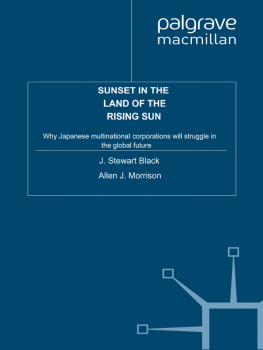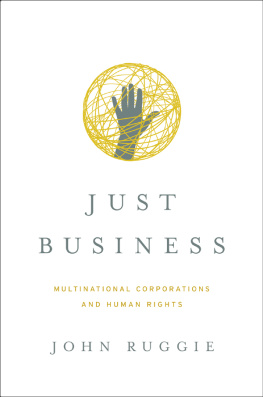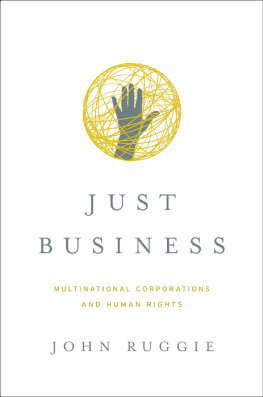SUNSET IN THE LAND OF THE RISING SUN
INSEAD Business Press Series
J. Stewart Black & Allen J. Morrison
SUNSET IN THE LAND OF THE RISING SUN
Why Japanese Multinational Corporations Will Struggle
in the Global Future
J. Frank Brown
THE GLOBAL BUSINESS LEADER
Practical Advice for Success in a Transcultural Marketplace
Lourdes Casanova
GLOBAL LATINAS
Latin Americas Emerging Multinationals
David Fubini, Colin Price & Maurizio Zollo
MERGERS
Leadership, Performance and Corporate Health
Manfred Kets de Vries, Konstantin Korotov &
Elizabeth Florent-Treacy
COACH AND COUCH
The Psychology of Making Better Leaders
Manfred Kets de Vries
SEX, MONEY, HAPPINESS, AND DEATH
Musings from the Underground
Juliette McGannon & Michael McGannon
THE BUSINESS LEADERS HEALTH MANUAL
Tips and Strategies for Getting to the Top and Staying There
Renato J. Orsato
SUSTAINABILITY STRATEGIES
When Does it Pay to be Green?
James Teboul
SERVICE IS FRONT STAGE
Positioning Services for Value Advantage
Jean-Claude Thoenig & Charles Waldman
THE MARKING ENTERPRISE
Business Success and Societal Embedding
Rolando Tomasini & Luk Van Wassenhove
HUMANITARIAN LOGISITCS
SUNSET IN THE LAND OF THE RISING SUN
Why Japanese multinational corporations will struggle in the global future
J. Stewart Black
Associate Dean, Executive Development Programs, INSEAD
Allen J. Morrison
Affiliate Professor of Management, INSEAD


J. Stewart Black & Allen J. Morrison 2010
All rights reserved. No reproduction, copy or transmission of this publication may be made without written permission.
No portion of this publication may be reproduced, copied or transmitted save with written permission or in accordance with the provisions of the Copyright, Designs and Patents Act 1988, or under the terms of any licence permitting limited copying issued by the Copyright Licensing Agency, Saffron House, 6-10 Kirby Street, London EC1N 8TS.
Any person who does any unauthorized act in relation to this publication may be liable to criminal prosecution and civil claims for damages.
The authors have asserted their rights to be identified as the authors of this work in accordance with the Copyright, Designs and Patents Act 1988.
First published 2010 by
PALGRAVE MACMILLAN
Palgrave Macmillan in the UK is an imprint of Macmillan Publishers Limited, registered in England, company number 785998, of Houndmills, Basingstoke, Hampshire RG21 6XS.
Palgrave Macmillan in the US is a division of St Martins Press LLC, 175 Fifth Avenue, New York, NY 10010.
Palgrave Macmillan is the global academic imprint of the above companies and has companies and representatives throughout the world.
Palgrave and Macmillan are registered trademarks in the United States, the United Kingdom, Europe and other countries.
ISBN: 9780230252226
This book is printed on paper suitable for recycling and made from fully managed and sustained forest sources. Logging, pulping and manufacturing processes are expected to conform to the environmental regulations of the country of origin.
A catalogue record for this book is available from the British Library.
A catalog record for this book is available from the Library of Congress.
10 9 8 7 6 5 4 3 2 1
19 18 17 16 15 14 13 12 11 10
Printed and bound in Great Britain by
CPI Antony Rowe, Chippenham and Eastbourne
Dedicated to our respective wives, Tanya and Angela,
for their patience and encouragement.

ILLUSTRATIONS
FIGURES
EXHIBITS

PREFACE
Imagine that you are a doctor and you have to tell a patient that he needs a knee and hip replacement. The surgery is necessary partly because of the patients inherent predisposition for joint degradation but primarily because the patient has been a dedicated runner over the past 50 years of his lifewhich generally is good for ones health, except in this case. The surgery is complex and has a number of risks associated with it, from life-threatening blood clots to dangerous postoperative infections. Even if the surgery goes well and post-operative complications are avoided, you know that the patient will face months of painful physiotherapy before he can enjoy the full benefits of the surgery. However, if the complicated surgery doesnt happen, you also know that the patient is only going to get worse. In fact, you are fairly sure that within months the patient will get to the point where he will not be able to run anymore and within a year he will likely have great difficulty and experience pain just walking. Before too many years, hell end up in a wheelchair.
As you contemplate the impending conversation with the patient, you get understandably anxious. You know the patient is going to be upset by the news. You can anticipate that he may even become angry with you as the messenger. As a consequence, its tempting to avoid the conversation. However, not saying anything, ignoring the problem, or pretending that it doesnt exist will not magically make the knee and hip regenerate. In addition, if you dont say anything, you will deprive the patient of the opportunity to undergo the needed surgery and to make the needed changes in his lifestyle. Still, even if you go ahead with the conversation, what should you say? How should you phrase things? Should you come to the point right away or ease into the need for surgery? How much should you stress the downside of not having the surgery versus the benefits of going ahead with it? Should you focus on the surgery and say little about the post-surgery physiotherapyits pain and durationor should you talk about all this upfront?
While we are not medical doctors, for us this project is analogous to the physicians story. We recognize that what we say in this book may offend some Japanese executivesand even some non-Japanese executives. But just as x-rays dont lie, neither do the numbers about the standing of Japanese MNCs (Multinational Companies). Based on all the major surveys and rankings, the number of Japanese firms among the largest global players has shrunk by about half over the past 15 years. Ignoring or avoiding this fact will not magically restore Japanese firms to their glory days of the past. Sadly, our experience with many, but certainly not all, Japanese executives is that they are not that interested in hearing the facts, especially when we have employed a typical soft, implicit Japanese approach in delivering the news of their decline. This is partly why we decided to adopt a much more direct style in the booka style that we recognize is counter-cultural for Japan and a style that for some Japanese executives might be uncomfortable. However, with 50 years of combined education and consulting experience, we have learned that sometimes when you are the bearer of bad news you have to shock patients into listening to it.
While there are benefits to taking a shock-therapy approach, we are well aware of the potential negative side effects, of which we want to highlight two. First, we recognize that in employing a shock-therapy approach, we run the risk that the person for whom the shock is intended will simply become more defensive and the intended message will not get through. We also recognize that such a strong approach may lead non-Japanese executives to become a bit complacent and think that they are immune to the problems that have infected a good number of Japanese firms. Obviously, we would be disappointed if either of these side effects materialized. However, the main effect of the message not getting through because of taking too soft a tone is, in our opinion, worse than either or both these potential side effects.
Next page













